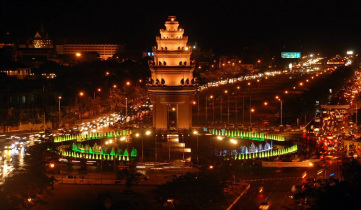Cambodia economics
|
Kingdom of Cambodia

Capital and largest city: Phnom Penh
Official languages: Khmer Government Unitary parliamentary constitutional monarchy King Norodom Sihamoni Prime Minister Hun Sen (CPP) Senate President Chea Sim (CPP) President of National Assembly Heng Samrin (CPP) Legislature Parliament Upper house Senate Lower house National Assembly Formation Funan Kingdom 68 Chenla Kingdom 550 Khmer Empire 802 French colonization 1863 Independence November 9, 1953 Monarchy restored September 24, 1993 Area Total 181,035 km2 Water (%) 2.5 Population 14,952,665 Currency Riel KHR The United States dollar is also often used. Time zone (UTC+7) The Kingdom of Cambodia, is a country located in the southern portion of the Indochina Peninsula in Southeast Asia. Its total landmass is 181,035 square kilometres (69,898 sq mi), bordered by Thailand to the northwest, Laos to the northeast, Vietnam to the east and the Gulf of Thailand to the southwest. With a population of over 14.8 million, Cambodia is the 68th most populous country in the world. The official religion is Theravada Buddhism, which is practiced by approximately 95% of the Cambodian population. The country's minority groups include Vietnamese, Chinese, Chams and 30 hill tribes. The capital and largest city is Phnom Penh, the political, economic, and cultural center of Cambodia. The kingdom is a constitutional monarchy with Norodom Sihamoni, a monarch chosen by the Royal Throne Council, as head of state. The head of government is Hun Sen, who is currently the longest serving leader in South East Asia and has ruled Cambodia for over 25 years. Cambodia's ancient name is "Kambuja" In 802 AD, Jayavarman II declared himself king marking the beginning of the Khmer Empire which flourished for over 600 years and allowing successive kings to dominate much of Southeast Asia and accumulate immense power and wealth. The Indianized kingdom built monumental temples such as Angkor Wat and facilitated the spread of first Hinduism, then Buddhism to much of Southeast Asia. After the fall of Angkor to Ayutthaya in the 15th century, Cambodia was ruled as a vassal between its neighbors until it was colonized by the French in the mid-19th century. Cambodia gained independence in 1953. The Vietnam War extended into Cambodia, giving rise to the Khmer Rouge, which took Phnom Penh in 1975. Cambodia reemerged several years later within a socialistic sphere of influence as the People's Republic of Kampuchea until 1993. After years of isolation, the war-ravaged nation was reunited under the monarchy in 1993 and has seen rapid progress in the economic and human resource areas while rebuilding from decades of civil war. Cambodia has had one of the best economic records in Asia, with economic growth averaging 6 percent for the last 10 years. Strong textiles, agriculture, construction, garments, and tourism sectors led to foreign investments and international trade. In 2005, oil and natural gas deposits were found beneath Cambodia's territorial waters, and once commercial extraction begins in 2013, the oil revenues could profoundly affect Cambodia's economy. |
©2013
www.afsconsultingcambodia.com
[email protected] (+855) 017 306 454 ALL RIGHTS RESERVED BY p-design
www.afsconsultingcambodia.com
[email protected] (+855) 017 306 454 ALL RIGHTS RESERVED BY p-design
